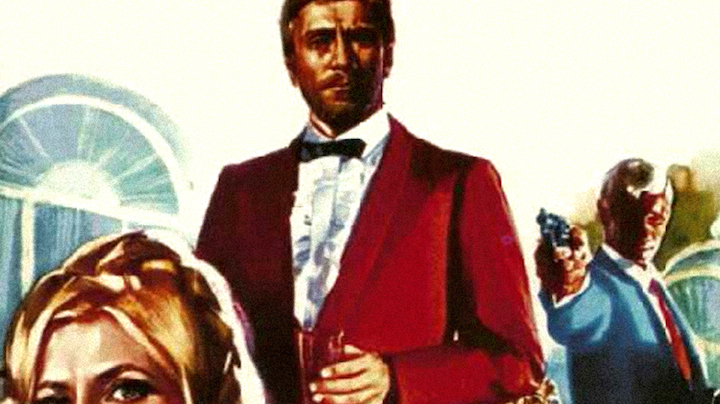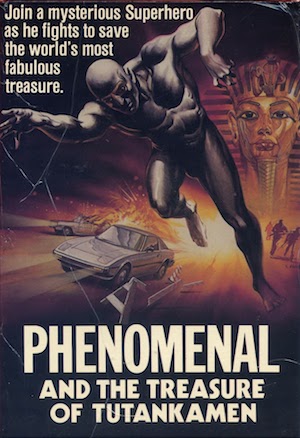
Phenomenal and the Treasure of Tutankamun (Italy, 1968) 95 min color DIR: “Roger Rockefeller” (aka Ruggero Deodato). PROD: Nicola Mauro Parenti. SCR: Ruggero Deodato, Aldo Iginio Capone. STY: Aldo Iginio Capone. MUSIC: Bruno Nicolai. DOP: Roberto Reale. CAST: Nicola Mauro Parenti, Lucretia Love, Gordon Mitchell, John Karlsen, Carla Romanelli. (I.C.A.R.)

In interviews, director Ruggero Deodato (best remembered for his later grindhouse classics Cannibal Holocaust and The House at the Edge of the Park) has stated that the film’s lead actor (also its producer) was “too stiff… a dog of an actor” (although they did work together on Zenabel a year later) and “that he didn’t give a shit about the film”. Therefore, if you begin this with low expectations, you might have a good time with it. Phenomenal (called Fenomenal in Italian prints, but the name is still seen inside a suitcase in international versions) is perhaps the least spectacular superhero on this page. Just a guy in a black jumpsuit and a full face mask, with canned overdubbed laughter, whose only superpower seems to be that he can fight really good.
As with Argoman, you see Phenomenal briefly in an opening stinger, before disappearing from the narrative for some time. Without him, you still have a movie, as Count Guy Norton (Nicola Mauro Parenti) attempts to foil the theft of the priceless King Tut exhibit in Paris, France. Because it lacks the usual superhero tropes, the film works best just as a simple “meat and potatoes” caper with some surprises along the way, in that nothing is what it appears to be: people don’t stay dead or remain in wheelchairs. Its breezy tone is complemented by the Bacharach-like vocalese that commonly scores these films.
This modest vehicle offers some production value bang for its buck, always whip-panning to such landmarks as the Eiffel Tower, or the Arc de Triomphe during the chase scenes. It culminates into a memorable climax involving a helicopter and boat on open water by Tunisia. Gordon Mitchell, an American bodybuilder who came to Italy initially to star in peplum films, is a lot of fun as the hired gun Falkov (say that name three times fast). It is a pity his role (though third-billed for marquee value) isn’t bigger. There is also an otherworldly feel to the film as the actor who plays Inspector Bauvais appears to be Middle Eastern; the film is Italian produced, set in France and Tunisia, yet feels British. (There is even a butler named Alfred!) One can see Deodato’s disdain for the film in that it is often clumsy in its pacing and claustrophobic in its framing, and that the final gag seems tacked on as an afterthought. Still, these liabilities in some way add to its grubby, scruffy appeal.
